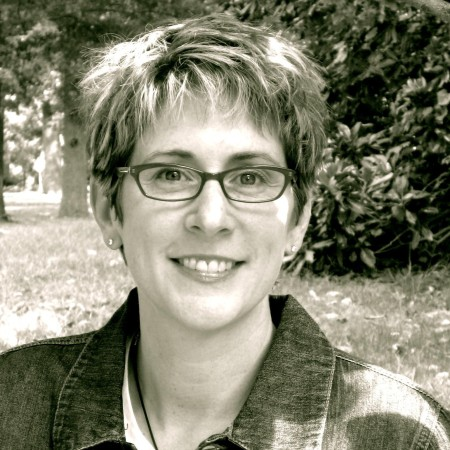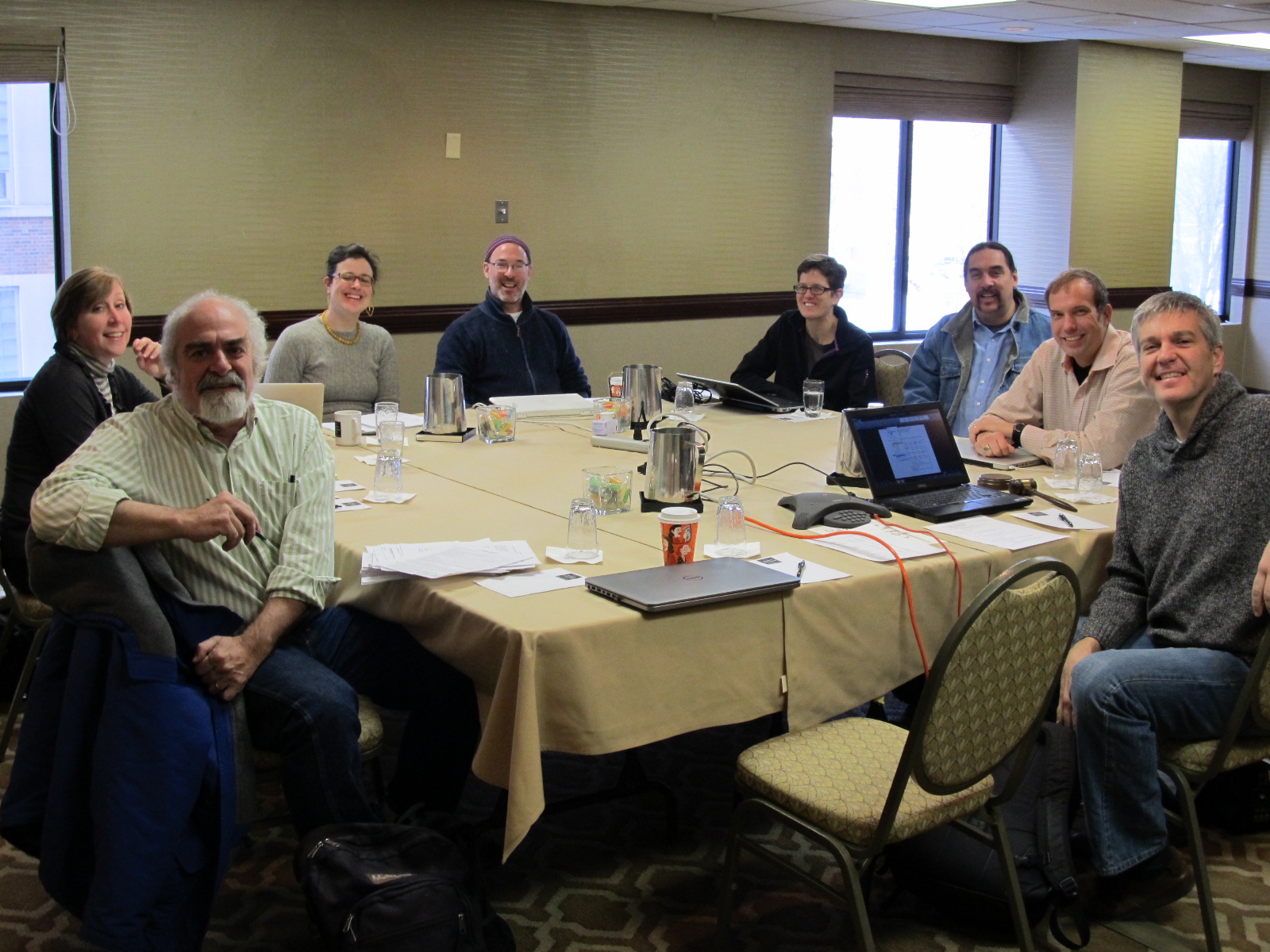By Caitlin Tyler-Richards
This summer, our editor-in-chief Kathy Nasstrom is taking a well-deserved break, and leaving the Oral History Review and related cat-herding in the hands of the extremely capable Stephanie Gilmore. As some may have read in the Oral History Association’s most recent newsletter, Stephanie is a multitalented historian who works to combat sexual assault on university campuses. With a PhD in comparative women’s history from the Ohio State University, she is the author of Groundswell: Grassroots Feminist Activism in Postwar America (Routledge, 2013), as well as many essays on sexuality and social activism. She serves as associate editor at The Feminist Wire and newsletter editor of the Committee of LGBT Historians’ biannual newsletter. She is also a member of the editorial collective at Feminist Studies.
A few weeks ago, I chatted with Stephanie about her experience with oral history, activist work and her plans for the OHR. I started with the most important and hard hitting question: “When did you first become interested in oral history?” Like many in the field, Stephanie told me she has always enjoyed listening to people talk about their lives and experience. She recalled one assignment in a undergrad women’s history course when she interviewed her own mother. While an admittedly simple approach to oral history, the experience drove home for Stephanie “that everyone has her own stories and experiences that can contribute to and complicate a larger history of a group.” This sentiment grew as Stephanie continued to work with women’s stories. She told me, “It was when I was working on my MA thesis on the Memphis chapter of NOW that I really came into the power and potential of oral histories. What I had learned about the women’s movement in its 1970s heydays was based on histories grounded in New York, Boston, and Chicago. These histories were often told as “national” histories of the US women’s movement. When I started studying feminist activism in Memphis, I discovered feminists whose lives were nothing like their counterparts in the North. The archival material was fairly rich, but only in talking to Memphis feminists about their lives and work did I actually learn how important southern identity was to them and to their activism.”
Stephanie had a similar experience working on her recently published book, Groundswell: “In Groundswell, I traced feminist activism through NOW in the 1970s and early 1980s in Memphis, Columbus, and San Francisco. Only through oral histories could I really understand how feminist activism shaped and was shaped by geographical location. For example, only in talking to Memphis feminists about their lives and work did I actually learn how important southern identity was to them and to their activism. But even more importantly, I found that archives could and would only tell me part of the histories I was looking to share and analyze. None of the people in my book are media ‘stars,’ but they were the rank-and-file movers of the women’s movement for equality and liberation. I could only find them by looking locally, and then by moving out of the archives and into people’s homes, coffeehouses, libraries, and other places I collected oral histories.”

Sophie Gilmore. © Sophie Gilmore. Do not reproduce without permission.
I learned that Stephanie uses oral history not only to study past feminists, but also to engage in her own activist work. After spending nearly a decade teaching, Stephanie became interested in issues outside the classroom — namely, how students react to and combat sexual violence in their everyday lives. At the moment, she is especially interested in understanding the gap between government and nonprofit research, which suggests approximately 1 in 5 women will experience sexual assault while at school, and Cleary Center documents, which report that little to no sexual assault occurs on university and college campuses. In order to understand the disconnect, Stephanie works with women, students of color and LGBTQ students who did not report their sexual assault experiences. She told me she did this for two reasons in particular, “On one hand, institutions can learn a great deal from these students and can start addressing the problem of underreporting sexual violence. But I also seek to elevate the voices of those who have been most marginalized in and beyond the academy. There is a tremendous amount of attention devoted to the issue of sexual violence on college campuses, and we are wise to listen to those who have been the victims of rape and other forms of sexual violence as we contemplate and enact solutions.” Stephanie also wanted to let readers know that she gives lectures and workshops on this topic. She welcomes anyone interested in learning more about her programs to contact her through her website, www.stephaniegilmorephd.com.
The more I learned about Stephanie, the clearer it became why OHA director Cliff Kuhn contacted her about the OHR position. When I asked how she felt about coming to work with the journal, she responded, “I’m delighted to think even more explicitly and historically about the connections between social movement activism and oral history as a legacy of social justice work. I owe so much of my own professional success to feminist, queer, and antiracist activism AND to oral history – and I have been able to learn and see how activism and history are intimately related. Editing a journal is a tremendous amount of work, but the opportunity to continue shaping the field of oral history as it relates to social justice activism is thrilling!”
She certainly sounded excited to join the OHR, but what exactly did she have in mind for the journal? “What’s in store? We will continue the short-form initiative that Kathy Nasstrom initiated – it is so exciting to hear from scholars, activists, and oral history practitioners about new developments, theoretical questions, and the like – things that are not quite a traditional article-length publication but relevant and important nonetheless. But we will also be taking on a couple of new ventures.”
Such as?
“The 50th anniversary of the Oral History Association is upon us, and Teresa Barnett has agreed to help facilitate a special section of the journal to commemorate; It is a good time to see where we’ve been, where we are, and where we are going. We are also calling for papers for a OHR special issue, “Listening to and Learning from LGBTQ Lives.” The immediate interest in the call suggests that we are onto a good idea here! And of course, we are always excited to see what our readers submit – so if people have ideas for short- or long-form articles, roundtables, or the like, please let me know!”
All in all readers, I think we’re in for a great time. Welcome to the team, Stephanie!
Caitlin Tyler-Richards is the editorial/media assistant at the Oral History Review. When not sharing profound witticisms at @OralHistReview, Caitlin pursues a PhD in African History at the University of Wisconsin-Madison. Her research revolves around the intersection of West African history, literature and identity construction, as well as a fledgling interest in digital humanities. Before coming to Madison, Caitlin worked for the Lannan Center for Poetics and Social Practice at Georgetown University.
The Oral History Review, published by the Oral History Association, is the U.S. journal of record for the theory and practice of oral history. Its primary mission is to explore the nature and significance of oral history and advance understanding of the field among scholars, educators, practitioners, and the general public. Follow them on Twitter at @oralhistreview, like them on Facebook, add them to your circles on Google Plus, follow them on Tumblr, listen to them on Soundcloud, or follow their latest OUPblog posts via email or RSS to preview, learn, connect, discover, and study oral history.
Subscribe to the OUPblog via email or RSS.
Subscribe to only history articles on the OUPblog via email or RSS.
The post Welcome to the OHR, Stephanie Gilmore appeared first on OUPblog.



